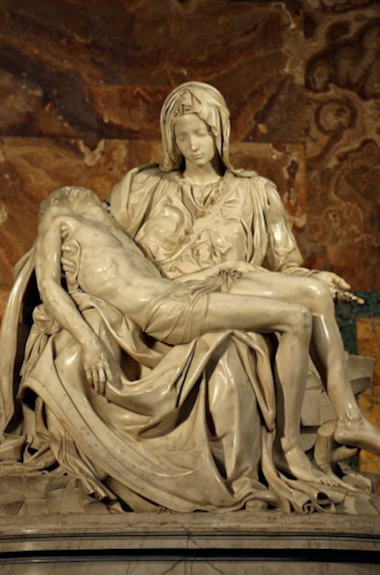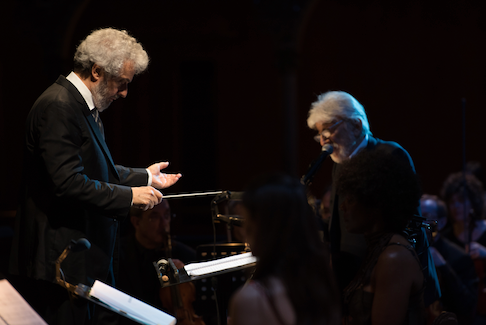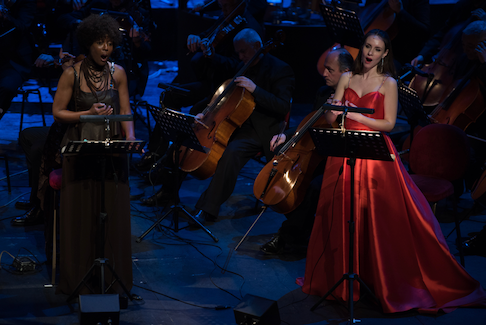Recently in Reviews
English Touring Opera are delighted to announce a season of lyric monodramas to tour nationally from October to December. The season features music for solo singer and piano by Argento, Britten, Tippett and Shostakovich with a bold and inventive approach to making opera during social distancing.
This tenth of ten Live from London concerts was in fact a recorded live performance from California. It was no less enjoyable for that, and it was also uplifting to learn that this wasn’t in fact the ‘last’ LfL event that we will be able to enjoy, courtesy of VOCES8 and their fellow vocal ensembles (more below …).
Ever since Wigmore Hall announced their superb series of autumn concerts, all streamed live and available free of charge, I’d been looking forward to this song recital by Ian Bostridge and Imogen Cooper.
The Sixteen continues its exploration of Henry Purcell’s Welcome Songs for Charles II. As with Robert King’s pioneering Purcell series begun over thirty years ago for Hyperion, Harry Christophers is recording two Welcome Songs per disc.
Although Stile Antico’s programme article for their Live from London recital introduced their selection from the many treasures of the English Renaissance in the context of the theological debates and upheavals of the Tudor and Elizabethan years, their performance was more evocative of private chamber music than of public liturgy.
In February this year, Albanian soprano Ermonela Jaho made a highly lauded debut recital at Wigmore Hall - a concert which both celebrated Opera Rara’s 50th anniversary and honoured the career of the Italian soprano Rosina Storchio (1872-1945), the star of verismo who created the title roles in Leoncavallo’s La bohème and Zazà, Mascagni’s Lodoletta and Puccini’s Madama Butterfly.
Evidently, face masks don’t stifle appreciative “Bravo!”s. And, reducing audience numbers doesn’t lower the volume of such acclamations. For, the audience at Wigmore Hall gave soprano Elizabeth Llewellyn and pianist Simon Lepper a greatly deserved warm reception and hearty response following this lunchtime recital of late-Romantic song.
Collapsology. Or, perhaps we should use the French word ‘Collapsologie’ because this is a transdisciplinary idea pretty much advocated by a series of French theorists - and apparently, mostly French theorists. It in essence focuses on the imminent collapse of modern society and all its layers - a series of escalating crises on a global scale: environmental, economic, geopolitical, governmental; the list is extensive.
For this week’s Live from London vocal recital we moved from the home of VOCES8, St Anne and St Agnes in the City of London, to Kings Place, where The Sixteen - who have been associate artists at the venue for some time - presented a programme of music and words bound together by the theme of ‘reflection’.
'Such is your divine Disposation that both you excellently understand, and royally entertaine the Exercise of Musicke.’
Amongst an avalanche of new Mahler recordings appearing at the moment (Das Lied von der Erde seems to be the most favoured, with three) this 1991 Mahler Second from the 2nd Kassel MahlerFest is one of the more interesting releases.
‘And there was war in heaven: Michael and his angels fought against the dragon; and the dragon fought and his angels, And prevailed not; neither was their place found any more in heaven … that old serpent … Satan, which deceiveth the whole world: he was cast out into the earth, and his angels were cast out with him.’
If there is one myth, it seems believed by some people today, that probably needs shattering it is that post-war recordings or performances of Wagner operas were always of exceptional quality. This 1949 Hamburg Tristan und Isolde is one of those recordings - though quite who is to blame for its many problems takes quite some unearthing.
There was never any doubt that the fifth of the twelve Met Stars Live in Concert broadcasts was going to be a palpably intense and vivid event, as well as a musically stunning and theatrically enervating experience.
‘Love’ was the theme for this Live from London performance by Apollo5. Given the complexity and diversity of that human emotion, and Apollo5’s reputation for versatility and diverse repertoire, ranging from Renaissance choral music to jazz, from contemporary classical works to popular song, it was no surprise that their programme spanned 500 years and several musical styles.
The Academy of St Martin in the Fields have titled their autumn series of eight concerts - which are taking place at 5pm and 7.30pm on two Saturdays each month at their home venue in Trafalgar Square, and being filmed for streaming the following Thursday - ‘re:connect’.
The London Symphony Orchestra opened their Autumn 2020 season with a homage to Oliver Knussen, who died at the age of 66 in July 2018. The programme traced a national musical lineage through the twentieth century, from Britten to Knussen, on to Mark-Anthony Turnage, and entwining the LSO and Rattle too.
With the Live from London digital vocal festival entering the second half of the series, the festival’s host, VOCES8, returned to their home at St Annes and St Agnes in the City of London to present a sequence of ‘Choral Dances’ - vocal music inspired by dance, embracing diverse genres from the Renaissance madrigal to swing jazz.
Just a few unison string wriggles from the opening of Mozart’s overture to Le nozze di Figaro are enough to make any opera-lover perch on the edge of their seat, in excited anticipation of the drama in music to come, so there could be no other curtain-raiser for this Gala Concert at the Royal Opera House, the latest instalment from ‘their House’ to ‘our houses’.
"Before the ending of the day, creator of all things, we pray that, with your accustomed mercy, you may watch over us."
Reviews

03 Apr 2019
La Pietà in Rome
Say "La Pietà" and you think immediately of Michelangelo’s Rome Pietà. Just now Roman Oscar-winning film composer Nicola Piovani has asked us to contemplate two additional Pietà’s in Rome, a mother whose son is dead by overdose, and a mother whose son starved to death.
Composer Piovani’s La Pietà is subtitled a "Stabat Mater" per due voci femminili, voce recitante e orchestra. The work makes use of the 13th century poem/prayer “Stabat Mater Dolorosa,” probably by Jacopone da Todi, known to literary scholars not only as a poet who explored primitive vernacular Italian but also as a visionary of medieval liturgical theater.
Mr. Piovani’s Stabat Mater is theater only in so much as it is made of words and needs the immediacy of live performance to take flight. Mr. Piovani’s Pietà is opera only in so much as it uses voice with music (melodramma) and song (arias and duets). Maybe it can be called opera theater because there is are threads of narrative that unfold, and a conclusion is reached — the maternal contemplation of the fact of her child’s death.
The single performance, March 20, did take place in the Teatro Costanzi (Rome’s opera house) thus adding default spectacle. A performance platform sat in front of the covered proscenium (hiding the current Gluck Orfeo ed Euridice installation). Thrusting well into the audience this stage instilled a welcomed urgency into the performance.
 Composer/conductor Nicola Piovani, Actor Giogi Proietti [all photos courtesy of the Teatro dell'Opera di Roma
Composer/conductor Nicola Piovani, Actor Giogi Proietti [all photos courtesy of the Teatro dell'Opera di Roma
Mr. Piovani composed this work in 1998 to verses by his friend Vincenzo Cerami (deceased in 2013), the screenwriter for Roberto Benigni’s Life is Beautiful, the film for which both Mr. Pioveni and Mr. Cerami received Oscars. Originally scored for 14 instruments at its premiere that same year the spoken role was taken by Mr. Piovani’s friend, actor Gigi Proietti, then 58 years old.
At the Teatro Costanzi just now 78 year-old Mr. Proietti was again the voce recitante. Mr. Proietti and Mr Piovani are now very well known and very respected figures in Italian film and theater thus Teatro Costanzi was filled to capacity with an enthusiastic and supportive audience.
To say that composer 72 year-old Piovani is prolific is an understatement. He has created the musical scores for 148 films and 49 plays and as well as has created 17 theater works (voices with music) plus a number of interesting chamber and orchestral works. Fortunately Nicola Piovani is a also very good composer.
For this performance of La Pietà Mr. Piovani expanded his chamber ensemble to symphonic proportions (the Rome Opera orchestra) — double winds with a full string complement (12/10/8/6/4), harp, two keyboards, expanded percussion plus a saxophone and batterie. The composer conducted.
 Amii Stewart, soul singer, and Maria Rita Combattelli, soprano
Amii Stewart, soul singer, and Maria Rita Combattelli, soprano
The six movements of La Pietà / Stabat Mater interspersed orchestral intermezzi with spoken excerpts from Jacopone da Todi’s prayer (both translated and in medieval Latin), alternating with the histories, spoken and sung, of the lives of two young men. One was from an affluent Europe, the other from third world Africa. The European mother was sung by Maria Rita Combattelli, a high (stratospheric) soprano, amplified only because all voices were amplified, the African mother was sung by African soul singer Amil Stewart. Gigi Proietti brought expected high style theatrical delivery of the text.
Mr. Piovani is a master of descriptive music, and he is very adept at diverse styles ranging from soul and pop to symphonic styles ranging from easy listening to avant-garde minimalist structures. All the styles were beautifully expanded to symphonic proportions. The art of the evening was not in the workmanlike creation of these musical styles as much as it was in the lively juxtaposition of the styles in service to a complex, emotional text.
It was a beautifully performed and presented evening, greatly appreciated by its audience.
Michael Milenski


